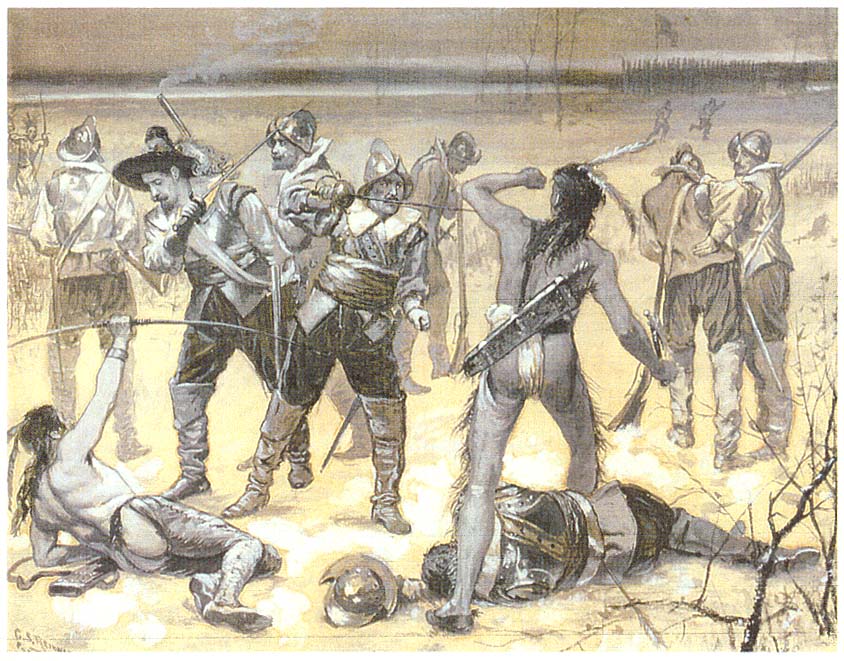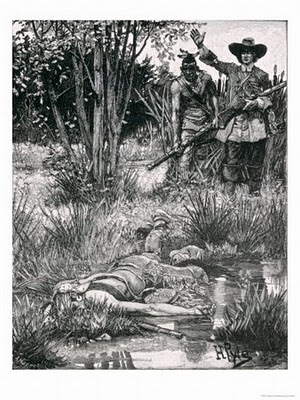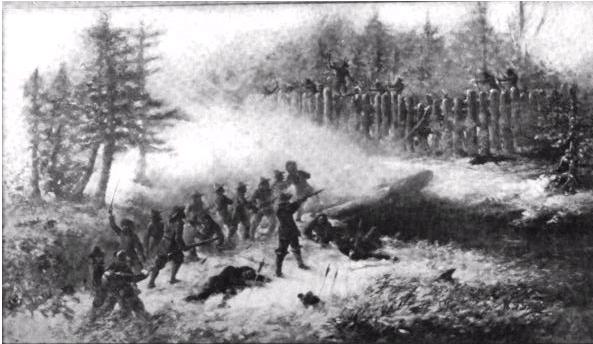This tale was originally posted on Andrea Zuvich's The 17th Century Lady. What has Joshua Tefft to do with 17th century ladies? He was the brother-in-law of George Gardner, the son of Herodias Long, my favorite Rhode Island resident in the 1600s.
Thank you to Andrea Zuvich for hosting me! My name is Jo Ann Butler,
and I’m the author of Rebel Puritan and The Reputed Wife. I’m currently
writing the final book in my Scandalous Life series, and it will include
an event which threatened New England’s very survival – King Philip’s
War.
In 1620, the Wampanoag Indians allowed the Pilgrims to to settle at
Plymouth without molestation. The land had belonged to their rivals, the
Massachusetts Indians, but that tribe had been nearly exterminated by a
smallpox-like disease. The Wampanoags themselves were decimated by the
same plague, so they were in no condition to drive away the English
settlers. They figured, let the Englishmen live here and be our allies
against other tribes, such as the powerful Narragansetts and Pequots to
their west.
 | |
| Lion Gardner during the Pequot War |
Fast forward seventeen years, and English settlements were
multiplying across the Connecticut coast. The Pequot Indians clashed
with those settlers over land and trade disputes. The Puritan colonies
amassed an army, drove the Pequots to ground, and slaughtered them as
they reduced the Indians’ refuge to ashes.
Remember ‘Off With His Head?’ As far as the Puritans were concerned,
they ruled New England. Indians who took up arms were rebelling against
their rightful leaders, and beheading was the English penalty for such
treachery. Governor John Winthrop recorded in his journal, “The Indians
about here sent in still many Pequots’ heads and hands from Long Island
and other places.” Those Indians bringing in heads were no doubt
rewarded with English goods, and across New England, severed Pequot
hands were posted on meeting house doors as a warning to local tribes to
keep the peace.
By the 1670s Englishmen had built a half-dozen large coastal cities,
and their towns were spreading inland. Sometimes the Wampanoags and
other tribes were compensated for losing their cornfields and access to
game and fish; sometimes not. That game was growing scarce, as were the
beaver the Indians once traded for English goods.
 |
| The beheading of King Charles I |
In summer 1675, friction between Native Americans and English
settlers broke into war. King Philip, or Metacomet, as he was known
among the Wampanoags, led several New England tribes in raids against
outlying settlements. It was an attempt to push settlers out of the
Indians’ most-valued lands, but those Englishmen were more numerous, and
better armed.
Hanging, beheading, and sometimes drawing and quartering, were
special punishments dealt out for high treason – criminal disloyalty
against the state. King Charles I was beheaded in 1649 for going to war
against his own people.
 |
| The death of King Philip |
New England’s Puritans regarded King Philip as a
traitor for his leadership role in the 1675-76 Indian uprising. After
Philip was shot in August, 1676, his body was quartered and sent as
grisly trophies to New England capitals. King Philip’s skull topped a
post at Plymouth’s fort for nearly three decades.
An
Englishman shared King Philip’s fate. Joshua Tefft of Kingstown, Rhode
Island was about 33 when he was executed on January 18, 1676. Joshua’s
unfortunate demise is of particular interest to me because of his sister
Tabitha. The young woman was married to George Gardner Jr., son of
Herodias Long, the heroine of my historical novels.
 |
| The Great Swamp Fight |
Some young men from Rhode Island’s powerful Narragansett tribe joined
King Philip in rebellion, but the tribe stayed out of the fray. That
ended in mid-December 1675. The Puritan colonies – Massachusetts,
Plymouth, Connecticut, and New Haven – assembled an army to end what
they perceived as a vast Narragansett threat. Rhode Island, where the
Narragansetts lived, had an amicable relationship with the tribe, but
that didn’t stop the Puritans. Their army crossed the border into Rhode
Island, and massacred the Narragansetts in the Great Swamp Fight of
December 19, 1675.
A few weeks later, a handful of starving Narragansetts were captured
while stealing cattle in Wickford, R.I. Joshua Tefft was among them. He
protested that he had been recently captured by the Narragansetts and
forced to serve them. However, it was noted that Joshua was armed with a
musket as an active participant in the cattle raid. Further testimony
revealed that Joshua had dwelt with the Narragansetts for fourteen
years. Other Indian captives said that he had helped the Narragansetts
design their swamp fort, and Massachusetts soldiers said they saw the
young man take an active role in the battle. As a final nail in Joshua’s
coffin, he was declared a heathen who had rebelled against his Godly
upbringing.
On January 18, 1676 Joshua was shot, his body hacked into quarters,
and left unburied. No doubt this unfortunate episode had a traumatic
effect on the Gardner family of Kingstown, R.I., who had already seen
their homes destroyed in the Indian uprising. I will explore these
tragic events in the final sequel to Rebel Puritan and The Reputed Wife.
While preparing this account, I wondered of other Americans had been
executed for treason. Apparently there was only one. An entry in
the Ancient Records of Virginia, Vol. 3 reads:
“July 13th, 1630. William Matthews servant to Henry Booth, indicted and found guilty of petit treason, by fourteen jurors. Judgment to be drawn and hanged.”
Petit treason occurs when a person commits criminal disloyalty
against a superior – a wife kills her husband, a clergyman slays his
superior, or a servant kills a master or mistress. The Virginia records
do not elaborate about William Matthews’ act of treason, but Henry Booth
does not appear in them after Matthews was sentenced. Apparently
William Matthews killed his master, and was hanged and disemboweled as
an object lesson to other rebellious servants.
Images and sources:
Flintlock and Tomahawk - Douglas E. Leach 1958




